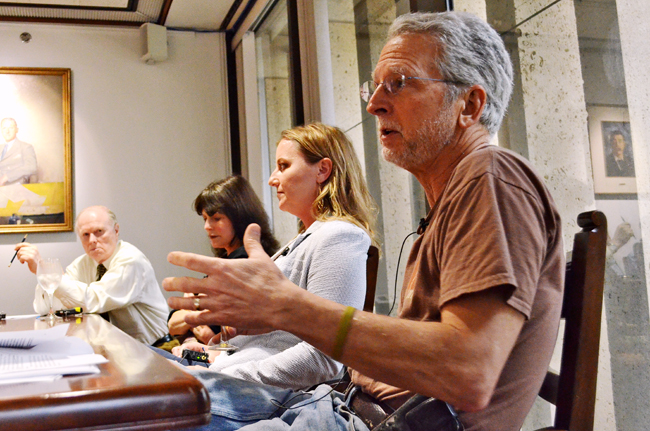In light of several recent investigations into racially insensitive fraternity misconduct around the nation, including one involving the UT Fiji chapter, panelists discussed Friday institutionalized racism at universities.
Although the black population in Texas is 12.4 percent, the University’s faculty is 3.5 percent black and the student body is 4.1 percent black — percentages that have been declining since 2010, according to Thomas Palaima, panelist and UT classics professor.
“Part of what I think is missed within the institution of higher education is essentially contact with the experience of the people who are targets or an understanding of what it must feel like [to be targeted],” Palaima said. “If you have a small dye in the big sea, how are you ever going to change the color perspective?”
In the current system, college students might not realize that they benefit from discrimination or fully understand the harm of perpetuate stereotypes, according to Rachel Quist, Plan II and art history senior. Coming in close contact with people who have different backgrounds is one viable solution, Quist said.
“What I think is a huge problem is the way in which behaviors that are directly harmful to disenfranchised groups are normalized in society in such a way that they become invisible to the people who might actually do things to stop it,” Quist said. “I grew up unaware that we were not in a post-racial society until I entered into a less homogeneous environment, and I heard what people had to say, and I heard about their real experiences that are nothing like my own.”
One way to deal with racial divisions is to force integration, according to Ryan Rafols, government senior and former UT Delta Kappa Epsilon chapter president.
“We don’t have a very diverse culture and population at UT. We like to think we do, but when you look at actual statistics, it’s not very high,” Rafols said. “So we can either accept more people of diverse backgrounds at the University and let things play out over time, or we can do forced integration and programs.”
The problem has less to do with fraternities and more to do with the unchanging dynamics of institutions, including universities, according to Palaima.
“You’re not going to eliminate [racism] unless you change the institutions, and even make people realize there have to be changes in attitudes,” Palaima said.





















